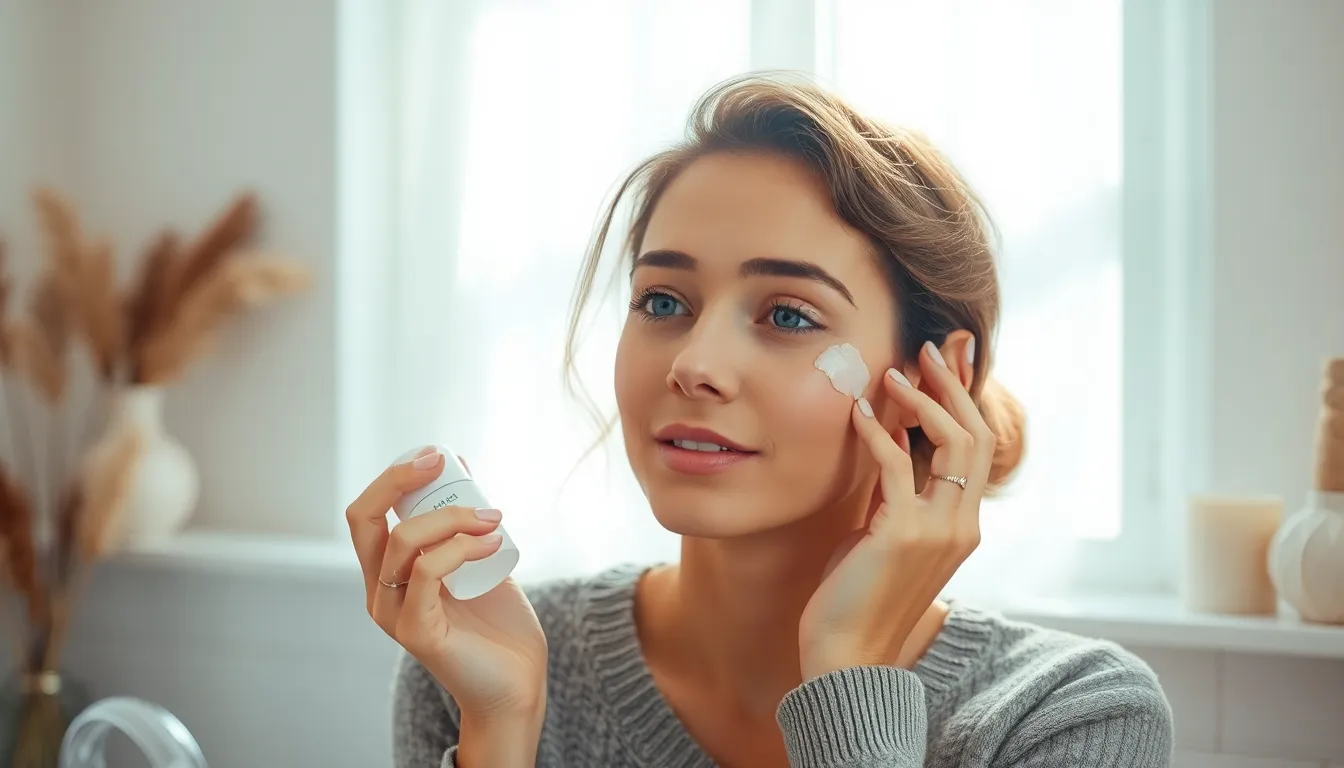Table of Contents
ToggleEveryone wants that glowing skin that turns heads and raises eyebrows. But let’s face it—between late nights, stress, and the occasional slice of pizza, keeping skin healthy can feel like a full-time job. Fear not, though! With the right skin health advice, anyone can achieve that radiant complexion without sacrificing their love for late-night snacks.
In this article, we’ll explore simple and effective tips that can transform skin from dull to dazzling. Say goodbye to complicated routines and hello to straightforward solutions that fit seamlessly into any lifestyle. It’s time to embrace the journey to healthier skin, armed with knowledge and maybe a few laughs along the way. After all, who said skin care couldn’t be fun?
Importance Of Skin Health
Skin health plays a crucial role in overall well-being and self-esteem. Healthy skin acts as a barrier against environmental factors like pollutants and harmful UV rays. Maintaining skin vitality prevents issues such as dryness, acne, and premature aging.
Visible signs of skin health often reflect internal conditions. For example, dry, flaky skin may indicate dehydration or poor nutrition. Clear and moisturized skin typically signifies a balanced diet rich in vitamins and antioxidants.
Proper skin care habits contribute significantly to skin health. Daily cleansing removes dirt and excess oils, while moisturizing maintains hydration. Sunscreen application is essential to protect against harmful UV radiation, reducing the risk of skin cancer and sun damage.
The connection between skin health and mental health is noteworthy. Individuals with healthy skin often report higher confidence levels, enhancing social interactions and personal relationships. On the contrary, skin issues can lead to stress and anxiety, creating a cycle that impacts overall well-being.
Regular skin health assessments further emphasize the importance of proactive care. Dermatologists recommend annual check-ups for early detection of potential issues. Consistent self-examinations encourage awareness of any changes in skin texture or appearance, which could require professional advice.
Ultimately, prioritizing skin health leads to improved physical and emotional quality of life. Small lifestyle adjustments can yield significant benefits, promoting a radiant complexion without extensive effort.
Common Skin Problems

Many individuals experience various skin issues despite striving for healthy skin. Common problems include acne, eczema, and psoriasis, each requiring specific understanding and management strategies.
Acne
Acne affects millions of people, primarily during teenage years. Hormonal changes often trigger breakouts, but stress and diet can also play a role. Effective management involves cleansing skin twice daily and using non-comedogenic products. Many find topical treatments containing benzoyl peroxide or salicylic acid beneficial. Consulting a dermatologist for severe cases can provide personalized care plans that cater to individual skin types.
Eczema
Eczema manifests as dry, itchy patches of skin and can occur at any age. Various triggers include allergens, stress, and harsh skin products. Moisturizing regularly helps reduce flare-ups, while identifying specific triggers also proves crucial. Individuals often benefit from gentle cleansers and topical corticosteroids during outbreaks. Seeking advice from a healthcare professional can help manage symptoms effectively over the long term.
Psoriasis
Psoriasis is characterized by red, scaly patches that can be itchy or painful. It occurs due to an accelerated skin cell life cycle, leading to a buildup on the skin’s surface. Treatment options range from topical therapies to phototherapy and systemic medications. Lifestyle adjustments, like stress management and dietary changes, may also help alleviate symptoms. Understanding the condition’s nature is vital for effective management and improving quality of life.
Daily Skin Care Routine
A consistent daily skin care routine is essential for achieving and maintaining healthy skin. This routine includes three fundamental steps: cleansing, moisturizing, and sun protection.
Cleansing
Cleansing effectively removes dirt, oil, and impurities from the skin. A gentle cleanser suited for the skin type helps avoid irritation. Daily cleansing, preferably twice a day, promotes a clear complexion and prepares the skin for other products. Regular cleansing prevents buildup that can lead to acne and other skin concerns. Incorporating a light exfoliation 1-2 times a week further enhances skin texture, allowing for better absorption of subsequent treatments.
Moisturizing
Moisturizing keeps the skin hydrated and supple. Applying a suitable moisturizer immediately after cleansing seals in moisture and protects the skin barrier. Opt for non-comedogenic products to prevent clogging pores. Daily moisturizing reduces the risk of dryness and flakiness, which can lead to premature aging. Individuals with oily skin should also prioritize this step, using lightweight formulations that balance oil production while providing hydration.
Sun Protection
Sun protection is crucial for preventing skin damage. Daily use of a broad-spectrum sunscreen helps shield the skin from harmful UV rays. Apply sunscreen every morning, even on cloudy days, as UV damage can occur regardless of weather conditions. Reapply every two hours, especially after sweating or swimming. Consistent sun protection reduces the risk of skin cancer and slows down the aging process, ensuring long-term skin health and vitality.
Diet And Skin Health
Diet significantly influences skin health. Proper nutrition supports the body’s ability to maintain a clear, radiant complexion.
Nutrients For Healthy Skin
Vitamins and minerals play a crucial role in skin health. Vitamin C contributes to collagen production, promoting elasticity and reducing wrinkles. Omega-3 fatty acids, found in fish, help maintain skin hydration and reduce inflammation. Antioxidants like vitamin E protect against free radical damage, supporting an even skin tone. Zinc aids in healing and can reduce acne outbreaks. Incorporating these nutrients into daily meals enhances skin health and appearance.
Foods To Avoid
Certain foods can negatively impact skin condition. Sugary snacks and beverages often lead to breakouts, as sugar spikes insulin levels that may increase oil production. Processed foods, high in trans fats, contribute to inflammation and dryness. Dairy products, particularly whole milk, can exacerbate acne for some individuals. Avoiding these foods can lead to clearer skin and improved overall complexion. Prioritizing whole foods, such as fruits, vegetables, and lean proteins, helps promote better skin health.
Lifestyle Factors
Lifestyle factors play a significant role in skin health. They encompass hydration, stress levels, sleep quality, and nutrition.
Importance Of Hydration
Hydration directly influences skin health and appearance. Drinking adequate water maintains skin moisture and elasticity. Experts recommend consuming at least 8 cups (64 ounces) daily, adjusting for individual activity levels and climate. Hydrated skin appears plump and radiant, while dehydration can lead to dryness and premature aging. Incorporating water-rich foods like cucumbers and oranges can additionally boost hydration levels. Individuals may notice a clearer complexion with consistent hydration.
Impact Of Stress
Stress negatively impacts skin health. It triggers hormone imbalances, leading to breakouts and other skin issues. Individuals under stress often experience increased oil production, which can result in clogged pores. Implementing stress management techniques like meditation, exercise, or deep breathing can improve overall skin condition. Regular physical activity also enhances circulation and promotes a healthy glow. Prioritizing relaxation can significantly enhance not only mental well-being but also skin appearance.
Prioritizing skin health is a journey that significantly impacts overall well-being. By adopting simple yet effective skincare habits and making mindful lifestyle choices, anyone can achieve and maintain a radiant complexion. Regular cleansing moisturizing and sun protection form the foundation of a successful routine while proper nutrition and hydration play crucial roles in enhancing skin vitality.
Understanding specific skin conditions and their management is essential for maintaining skin health. Implementing stress management techniques and ensuring quality sleep can also improve skin appearance and boost confidence. Embracing these practices not only leads to healthier skin but also fosters a positive self-image and enhances daily interactions. With consistent effort and care anyone can enjoy the benefits of glowing skin.







